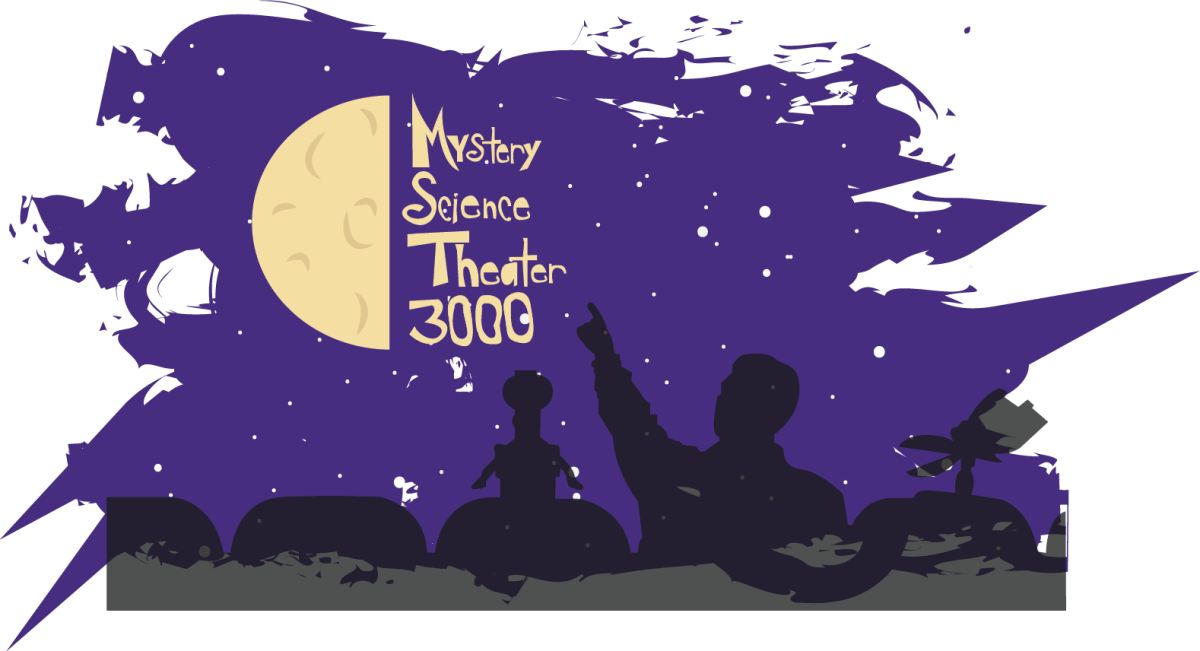Cult comedy program “Mystery Science Theater 3000” returns on Netflix
In 1988, the Minneapolis public access TV station KTMA greenlit a comedy program created by standup comedian Joel Hodgson. The premise was relatively simple: Janitor and inventor Joel (played by Hodgson) is launched into space by his mad scientist employers, who force him to watch awful B-movies in an attempt to see which makes him go crazy. To keep his sanity, Joel builds a team of sentient robots from parts of the ship, and they watch the movies together and crack jokes back at the screen.
The show was called “Mystery Science Theater 3000,” or “MST3K” to its fans, and it ran for 11 years, going through two cancellations, two network changes, another host, a major motion picture (“Mystery Science Theater 3000: The Movie”), a Peabody Award and 197 episodes in the process.
Its fanbase of “Mysties” reaches across generations. Rachel Cox, ’19, watched it with her family as a child.
“Whenever my family did a movie night and we couldn’t decide on anything, we just watched ‘MST3K,’” Cox said. “It was a real crowd-pleaser, and the commentary was really funny.”
The show is also revered in the comedy community. SJU Improv co-president Jimmy Wyatt, ’17, first learned about “MST3K” while working at Philadelphia’s Helium Comedy Club, and started watching it from there.
“I told my coworkers I hadn’t seen it,’” Wyatt said. “And they were like, ‘What do you mean you haven’t seen it?’ They gave me a list of episodes I had to see.”
In every episode, the crew trapped on the Satellite of Love were forced to watch an abysmal B-movie, with titles including “Danger!! Death Ray,” “Hercules Against the Moon Men,” “The Final Sacrifice” and, for a holiday special, “Santa Claus Conquers the Martians.” The jokes that Joel and the robots shot back at the movies proved to be the main draw of the show.
Jeffrey Hyson, Ph.D, assistant professor in the department of history, says the commentary may have been inspired by the advent of home video in the early-to-mid 80s, and likely influenced comments in today’s culture.
“Whether it’s Snapchat or Periscope [a live video streaming service], where you have something live at that moment and people are bringing in comments, I think that the sense of engagement between makers and consumers is very consistent with the style of ‘MST3K,’” Hyson said. “It was the impact of group-watching home videos in the 1980s.”
“MST3K” is also credited for popularizing some of the worst films ever made, including “Monster A-Go-Go,” “The Beast of Yucca Flats” and, most notoriously, “Manos: The Hands of Fate.”
Jackey Neyman Jones acted in “Manos” as a child, with her father Tom Neyman playing the film’s villain. She hadn’t seen the film since its 1966 premiere, until one day in 1993, when her father called.
“My dad was a big ‘Mystery Science Theater’ fan, he liked watching it on Sunday afternoons,” Jones said in a phone interview. “And he was watching the show one day and fell asleep. But he heard some familiar music, and he opened his eyes and saw himself on the screen.”
“Manos” proved to be one of the program’s most beloved episodes, with the show’s official revival league calling it the best episode of the series. The film’s popularity on “MST3K” has led to a musical, a puppet show, video games, references in “How I Met Your Mother” and “Elementary,” a book written by Jones (“Growing Up with Manos: The Hands of Fate,” with an introduction written by Hodgson) and a crowdfunded sequel, “Manos Returns,” which is currently in post-production.
“MST3K” had been off the air for 16 years, but in 2015 Hodgson announced plans to revive the show through a campaign on the crowdfunding website Kickstarter. Over the course of a month, 48,270 fans donated $5,764,224 to bring back the show. With other non-Kickstarter funds taken into account, a record $6.3 million was raised for the project, which premieres on Netflix on April 14 in a special series named “Mystery Science Theater 3000: The Return.”
Jones says that she will watch the new season when it becomes available to stream, and has some advice for any other filmmakers whose movies are mocked.
“Embrace it,” Jones said. “I always say, if you can’t be the best, make the best of being the worst.”














































